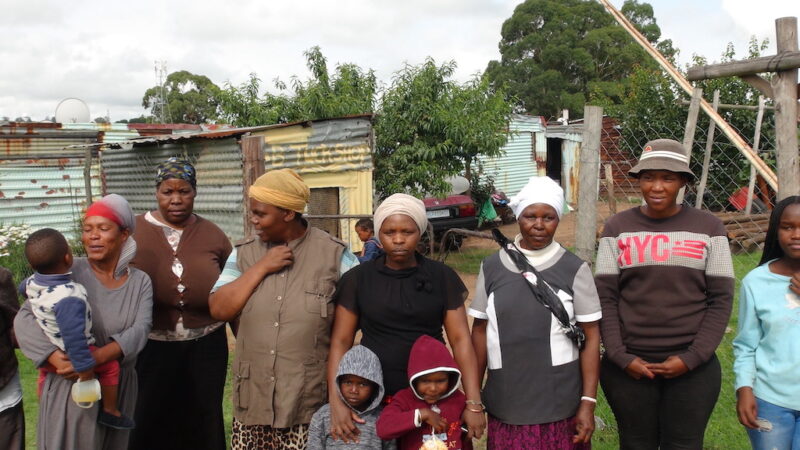Almost 80% of the more than 80,000 residents working in Ermelo are employed by Eskom and Transnet, the state-owned energy and transport companies
Coal is a booming business among communities living in or near Ermelo, the commercial hub of Gert Sibande district municipality in South Africa’s Mpumalanga province. Situated about 200km east of Johannesburg, Ermelo is home to Camden coal power station, scheduled to be shut down by 2025.
“Coal is the heritage of this province, it is the backbone of our economy. It’s an undeniable fact,” says Philani Mngomezulu, founder of an established community-based greening project in the municipality called the Khuthala environmental group.
According to Mngomezulu, almost 80% of the more than 80,000 residents working and generating income in Ermelo are employed at Eskom and Transnet, the state-owned energy and transport companies. Camden is one of 12 coal power stations in Mpumalanga scheduled to be decommissioned in the coming years, most of them by 2035.
“As an environmental group, we are clear about the impact of coal on our environment, in particular climate change and pollution. However, as the community of Ermelo we will only be in agreement with the energy transition if it is going to impact positively on the local people,” he says.
Ermelo and other coal-mining regions in Mpumalanga province are at the frontline of South Africa’s Just Energy Transition (JET) process, which aims to repurpose coal power plants and coal-mining lands to greener energy. But coal workers are still hesitant and have said to feel left out of the country’s energy transition.
Lack of consultation
According to Mngomezulu, however, the people of Ermelo are in the dark when it comes to the transition because the government is not bringing consultations to the communities.
“We’ve been saying to the presidential climate commission [PCC] that they must come and do a proper consultation in Ermelo because people here are dependent on coal, so if we are going to shut down the power stations and any other coal mines without informing the community, that’s a bit unfair,” he said.

The PCC is a multi-stakeholder body set up by President Cyril Ramaphosa to “oversee and facilitate a just and equitable transition towards a low-emissions and climate-resilient economy” in South Africa.
Thulani Madlala, a ward councillor in the Msukaligwa municipality, says he is waiting to see how the transition will assist the local poverty-stricken people.
“We are waiting for the JET to be explained to the masses of our people on the ground. We hope that this programme doesn’t negatively affect the unemployment rate that is already here because, if that’s the case, our people are going to be against the transition,” Madlala says.
Meanwhile, Ermelo communities are living in “energy poverty: most of our informal settlements don’t have electricity, so they rely on coal, and some are able to profit from coal sales”, he says.
‘Causing havoc’
Data collated by the Oxpeckers’ #MineAlert tool shows that at least 227 government-licensed coal mines surround Ermelo. The area is also home to more than 3,000 small-scale artisanal miners who contribute to the local economy, pay rent, buy clothes and provide jobs.
Given Masina says the downside of phasing out coal is that businesses such as his will have to close. He started a coal yard in Wesselton, Ermelo’s satellite township, in 2011 that sells coal to community members and he employs people from the community.
Masina says they had not heard anything from the government about consultations with the community. “Look, if they decide to phase out coal, this means I will also have to retrench the employees I have so far employed.”
“There is no doubt that this transition is causing havoc in South Africa. At the moment, power stations are being bombed because of this transition that is not being explained properly to the people of the country,” Masina says.
In December, the government deployed troops to at least four Eskom power stations after a series of incidents of theft and sabotage.
Employment opportunities
The JET plan, released in 2022, states that more than half the youth in Mpumalanga communities are unemployed and the coal value chain decline will further narrow employment opportunities as the sector downscales.
It shows that the coal sector provides direct jobs to almost 90,000 people in mines and power plants in the province, and indirect jobs for people who provide goods and services to the coal sector, which supports a significant portion of induced jobs and other economic activities.
Power utility Eskom says the implementation of JET is envisaged to create some 300,000 jobs in the renewables value chain. “This represents a net jobs gain,” said an Eskom spokesperson in response to Oxpeckers’ questions.

Given Masina says his coal yard will have to close and retrench employees from the local community (Photo: Thabo Molelekwa)
Research by the Institute for Advanced Sustainability Studies published in 2022 indicates that in South Africa as a whole, job crea
Read More

